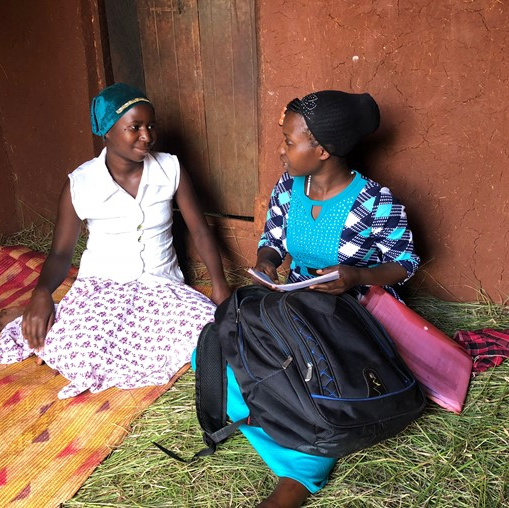“Backpack” Workers and Volunteers Provide PrEP for Vulnerable Populations in Tanzania
“I am very relieved to receive PrEP services. It reduces my anxiety, and I know now I will be safe, although I will continue using condoms.” – Male client on PrEP
In Tanzania there is a project that with innovative community approaches has expanded its accessibility of HIV prevention services for key and vulnerable populations (KVP) and adolescent girls and young women (AGYW) in just four years.
In October 2016, the U.S. Centers for Disease Control and Prevention (CDC) and ICAP at Columbia University (ICAP), initiated a five-year project coined “Comprehensive Community-Based HIV Prevention, Linkage, and Retention Services for Key Populations and Adolescent Girls and Young Women in the United Republic of Tanzania under PEPFAR”, commonly known as the FIKIA project. In Swahili, the language spoken in Tanzania, the word FIKIA means “to reach,” which is exactly the goal of the FIKIA project: to reach every client with lifesaving HIV prevention and treatment services.
In collaboration with the Ministry of Health, lsoCommunity Development, Gender, Elderly and Children (MoHCDGEC), the FIKIA project provides comprehensive, community-based HIV prevention services to key and vulnerable populations (KVP) and other priority populations in seven regions across Tanzania (Dar es Salaam, Pwani, Mwanza, Mara, Kigoma, Kagera, and Geita).

Health worker meets with community member.
Photo Credit: ICAP
The FIKIA project expands the availability and accessibility of HIV prevention services for KVP and AGYW. In May 2018, as part of the project, CDC and ICAP began to offer HIV Pre-Exposure Prophylaxis (PrEP) to clients in the community through community outreach services.
This community outreach services are “health facility-led” initiative pairs health care workers from facilities with peer volunteers who travel to provide direct services to those who need them the most. The KVP peers and AGYW community outreach volunteers use guidance to create ‘localized’ demand for PrEP services. They are the central pillar to ICAP’s PrEP implementation, as they are responsible for integrating PrEP into routine community outreach. Additionally, community outreach volunteers help eliminate stigma and encourage clients to engage with HIV prevention, testing, and treatment services.
Lessons from earlier PrEP projects undertaken in Tanzania underscore the importance of using peer or near-peer counterparts to reach and retain clients on PrEP. The FIKIA project team used these findings to build its workforce of community outreach volunteers which currently includes 89 AGYW and KVP peer community outreach volunteers, and 96 government healthcare workers and staff. These volunteers have been instrumental in initiating 9,574 clients on PrEP in 16 councils of Dar es Salaam, Mwanza, Pwani, Kagera and Kigoma regions from June 2018 to September 2020.
Backpack PrEP Outreach Activities
As part of the CDC-supported program, ICAP also reaches clients and provides PrEP refills through health facility-led community outreach activities. One type of outreach activity, called “backpack,” involves healthcare workers who, armed with a backpack full of resources, provide routine community HIV testing, antiretroviral therapy (ART) initiation and refill services, and PrEP refills in hotspot locations.
These “backpack” healthcare workers overcome travel barriers to get into hard-to-reach communities. Healthcare workers walk, use motorbikes, cars, bajaji’s (auto rickshaw’s) or mobile clinics to reach clients. This mobile delivery approach has improved retention among KVP who may face challenges in accessing health facilities. From July 2018 to September 2020, a total of 5,805 clients were retained on PrEP services, which is 61 percent of those initiated, in the 16 councils. PrEP refills are driven primarily by community outreach volunteers who work alongside healthcare workers to trace and follow-up with clients to ensure they continue to take their PrEP medicines.
“PrEP is comforting! I really wish every woman would know about it and start using PrEP, especially those who are in a vulnerable situation like mine,” said one female client.
The FIKIA project stays client-centered and leverages peer-influence to successfully deliver PrEP to at-risk clients in hard-to-reach communities. CDC, ICAP and MoHCDGEC commit to scale up services and ensure continued availability of PrEP to prevent new HIV infections across Tanzania.
Reflection from a PrEP Champion
Tom (not actual name) is a volunteer who received training from the MoHCDGEC on key and vulnerable population-friendly services and PrEP services. He has worked as a community outreach volunteer and PrEP champion with the CDC/ICAP initiative since 2017. As a leader and change agent in his community, Tom provides tailored adherence support to his peers for PrEP services. Tom has adhered to PrEP for over a year, so he can counsel his peers in a relatable and empathetic way.
“Being a community outreach volunteer, I can see that I have become a new person. I know how to protect myself from HIV by using PrEP and condoms. I am now working to encourage my fellow peers who are at risk to use PrEP and condoms to prevent HIV infection,” said Tom.
Since September 2019, Tom has mobilized and provided support to more than 100 clients through PrEP services, and reports that all his clients are happily adhering to PrEP.